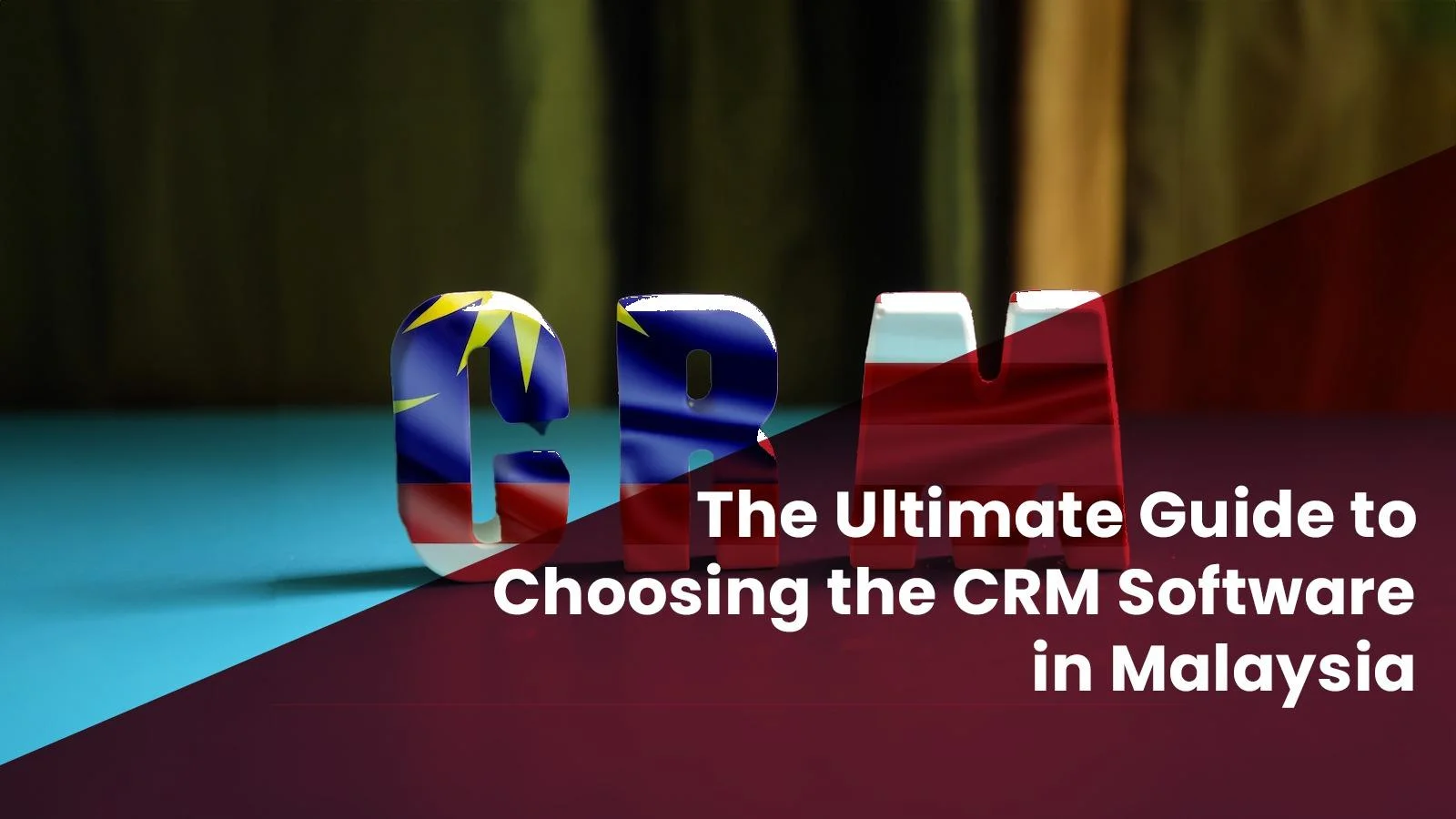Choose a Right CRM Software in Malaysia
Introduction
Starting with spreadsheets to manage and build personal customer relationships when your customer base is small or is starting is sufficient. But as your business expands, it is difficult to maintain the same.
This is where Customer Relationship Management (CRM) Software saves the day. CRM is a software system that tracks and stores customer information, both potential and existing. The software acquires information from multiple sources and organizes the data within a single database.
In a competitive market like Malaysia, CRM plays a vital role in increasing efficiency, enhancing customer satisfaction and staying ahead of the competition.
Understanding CRM
CRM is excelling in the business landscape around the world for good reasons.
Generally, CRM offers two main benefits: increased efficiency and improved customer relationships.
Increased efficiency:
CRM can help your business focus on high-value activities such as building and strengthening customer relationships by automating tasks such as data entry and marketing.
Contact management is the priority and CRM automatically updates the information and interaction, eliminating the need for manual effort. This information is accessible by every department, enabling better collaboration and ready data whenever necessary.
Improved customer relationships:
With marketing automation in place, sending personalized campaigns is a piece of cake. With the entire history of a customer available at your fingertip, creating a high-quality, individualized experience is easy.
Data-driven insights also help you find areas of improvement to help you provide customer satisfaction and build loyalty.
Being scalable and flexible, CRM allows you to expand your business to a larger customer base and accommodate evolving needs while maintaining the same personalization as before.
Evolution of CRM
Early Database Systems (1980s-1990s): CRM’s origins start with the use of database systems to store customer information. Companies started using simple databases to keep track of customer names, addresses, and purchase history, which laid the foundation for organized customer data management.
Contact Management (1990s): In the 1990s, CRM evolved into contact management software. These systems allowed businesses to store customer data and manage interactions such as calls, emails, and meetings. This marked the beginning of CRM as a tool for sales and customer service teams.
Sales Automation (Late 1990s-2000s): CRM systems expanded to include Sales Automation tools, which aimed to streamline sales processes. Sales Automation features included lead tracking and sales forecasting. These systems helped sales teams become more efficient and data-driven.
Marketing Automation (2000s-2010s): As marketing became increasingly digital, CRM systems incorporated Marketing Automation capabilities. This allowed businesses to create targeted marketing campaigns, track customer behavior, and analyze campaign effectiveness.
Multichannel Integration (2010s): With the increase of digital channels and social media, CRM systems evolved to incorporate multichannel integration. Businesses could now track customer interactions across various touchpoints, including websites, social media, email, and mobile apps. This provided a more comprehensive view of the customer journey.
Opportunities for CRM Software in Malaysia
E-commerce Growth: CRM can help businesses enhance online shopping experiences and retain customers.
Mobile Penetration: High mobile penetration rates provide opportunities for mobile CRM applications, such as personalized mobile marketing and customer service apps.
Digital Marketing: The digital marketing landscape is expanding in Malaysia, making it easier for businesses to implement targeted marketing campaigns and track customer behavior for CRM purposes.
Customer Experience Enhancement: By focusing on customer experience through CRM, businesses can differentiate themselves in the market and build lasting customer relationships.
Types of CRM Solutions
On-premise vs. Cloud CRM
1.Deployment Location:
On-Premise CRM: On-premise CRM software runs on servers located within a company’s physical infrastructure. This means businesses have full control over their data and systems, but it also requires significant IT resources for maintenance and upgrades.
Cloud CRM: With cloud CRM, also known as Software as a Service (SaaS), third-party providers maintain the software and are hosted on external servers. Users access the CRM system through the Internet. Cloud CRM offers flexibility and scalability without the need for on-site infrastructure.
2.Cost Considerations:
On-Premise CRM: Upfront costs for on-premise CRM are expensive, including software licenses, hardware, and IT personnel for installation and ongoing maintenance. However, over time, the total cost of ownership may become more predictable.
Cloud CRM: Cloud CRM typically involves lower initial costs, as it often operates on a subscription basis. Businesses pay recurring fees for software access and support. This model can be cost-effective for smaller businesses or those seeking scalability.
3.Maintenance and Updates:
On-Premise CRM: Businesses are responsible for managing and maintaining their on-premise CRM systems, including software updates, security patches, and hardware maintenance.
Cloud CRM: Cloud providers handle system maintenance, updates, and security. This frees businesses from IT-related tasks, allowing them to focus on CRM strategy and user adoption.
4.Scalability:
On-Premise CRM: Scalability in on-premise CRM often requires purchasing additional hardware and software licenses, which can be time-consuming and costly.
Cloud CRM: Cloud solutions offer easy scalability, allowing businesses to increase or decrease user licenses and storage as needed. This flexibility is particularly beneficial for businesses with fluctuating demands.
5.Accessibility and Mobility:
On-Premise CRM: Access to on-premise CRM systems may be limited to the office network, making remote access and mobility more challenging. Mobile access may require additional setup and security measures.
Cloud CRM: Cloud-based CRM is accessible from any internet-connected device, making it ideal for remote work and mobile sales teams. This accessibility enhances user collaboration and responsiveness.
6.Security and Data Control:
On-Premise CRM: Businesses have full control over their data and can implement their security measures. However, the responsibility for data security falls on the organization.
Cloud CRM: Cloud providers invest heavily in security infrastructure and compliance. Data is stored in secure data centers with disaster recovery measures. While this offers robust security, some businesses may have concerns about data control and compliance.
Key Features of CRM Systems
Customer Data Management:
You can store and organize customer information as well as keep a record of all customer interactions, such as calls, emails, meetings, and purchases.
CRM also automatically updates customer data with additional information from external sources.
Sales and Lead Management:
You can capture and manage potential sales leads, including contact details and lead sources. You will be able to visualize the stages of the sales process, from lead generation to deal closure. With sales forecasting, you can predict future sales revenue based on historical data and current opportunities.
Marketing Automation:
CRM helps you create and send targeted email campaigns to leads and customers. Planning, executing, and analyzing marketing campaigns across various channels is effortless. You can automatically nurture and score leads based on their engagement with marketing materials.
Reporting and Analytics:
You can create and customize dashboards with key performance indicators (KPIs) and metrics. You can also analyze sales and marketing performance to identify areas for improvement. You can also get a deep understanding of customer behavior and preferences through data analysis.
Selecting the Right CRM Software in Malaysia
Evaluate your business needs
Before selecting the CRM software, the first step is to evaluate your business needs. Consider the following:
– The size and scale of your business
– Industry-specific requirements
– Sales and marketing goals
– Technical proficiency of your team
– Integration requirements
Compare CRM Software in Malaysia
After planning your specific needs, you can start going through the CRM options available. Consider these steps:
– Search online and make a list of options that align with your business goals.
– Ask for recommendations from business peers and industry associations.
– Look for case studies and reviews.
– Whenever possible, ask for demos and trials to get a hands-on experience of the software.
Factors to consider when choosing a CRM vendor
Once you’ve narrowed down your available options, consider these factors:
– Vendor reputation
– Customer support and training programs
– Scalability
– Data security and compliance
– Customization
– Cost
– Integration capabilities
Implementing CRM in Your Business
Pre-implementation preparations
– Start by establishing clear and specific objectives.
– Determine your budget.
– Based on your goals and budget, start researching available CRM vendors.
– Clean and organize your existing data before data migration.
– Assess your IT infrastructure and consider how the CRM will integrate with other tools and systems.
Step-by-step CRM integration process
– Transfer your existing data to the CRM system
– Tailor the CRM to match your business processes
– Integrate the CRM with other software used by your business
– Provide training to your team
– Conduct thorough testing of the CRM system
– Encourage and monitor user adoption
– Gather feedback from users and stakeholders
– Continously monitor the performance of your CRM system
Common pitfalls and how to avoid them
Implementing a CRM system is a transformative process for a business and often comes with challenges. Here are some common pitfalls and how to avoid them:
1. Lack of clear objectives: Implementing CRM without well-planned objectives can lead to unnecessary issues and wasted resources. The first step is to always define specific and clear objectives.
2. Insufficient user training: Insufficient user training can lead to low adoption and errors. Invest in training programes, provide on-going support and create user-friendly training materials.
3. Data quality issues: Poor data quality can undermine the effectiveness of a CRM system. Conduct data clean-up and standardization before migrating to the CRM.
4. Overcustomization: Overcustomization can make the CRM complex and difficult to maintain. Focus on tailoring the CRM to your needs without overcomplicating it.
5. Lack of executive support: Without leadership support, you may lack resources and commitment needed for success. Ensure that they understand the benefits and workings of the CRM so they actively champion the CRM project.
6. Poor communication: Lack of proper communication can lead to resistance and confusion. Highlight the benefits, address concerns, and keep everyone informed of progress and milestones.
Measuring CRM Success
Measuring the success of the CRM system depends on key performance indicators (KPIs) such as customer satisfaction, retention rates, and sales revenue.
Successful CRM adoption is based on clear communication, comprehensive user training, and executive support. Handle resistance to change by addressing concerns, highlighting the advantages and celebrating small wins. Ensure data security and compliance through robust measures like access controls, audits and encryption. By addressing these factors, businesses can maximize CRM benefits, enhance customer relationships, and streamline operations.
CRM Trends and Innovations
CRM software is continuously evolving with new trends and innovations. Certain emerging technologies include mobile CRM for on-the-go connectivity and social CRM for engaging with customers on social media.
IoT integration enables data collection from devices, enhancing customer insights. In the realm of AI and machine learning, predictive analytics aids in lead generation and churn prevention, while chatbots and virtual assistants provide automated support. Embracing these trends allows businesses to build stronger, more profitable customer relationships and stay competitive in a dynamic market.
CRM for Different Industries
Since CRM can be customized to cater to the unique requirements of each business, different industries can benefit from utilizing a CRM system to build and maintain strong customer relationships while optimizing their operations.
Certain ways in which a CRM system helps different industries:
– Segment customers based on purchase history, demographics, and behavior to target them with personalized marketing campaigns.
– Optimize inventory levels, ensuring products are available when customers need them.
– Manage sales across multiple channels.
– Maintain detailed profiles of clients.
– Identify potential clients and manage the sales pipeline efficiently.
– Efficiently schedule and manage patient appointments, reducing wait times and improving the patient experience.
Conclusion
The scope of CRM around the world continues to grow. With its capacity for personalized marketing, efficient sales management, and improved customer support, CRM software in Malaysia businesses to thrive in a competitive market.
Whether you operate in retail, finance, healthcare, or any other sector, CRM can be customized to your unique needs and objectives. By embracing CRM, you’ll find that it’s not just about managing relationships—it’s about nurturing them, ensuring mutual value, and securing a prosperous future for your business in Malaysia.
Therefore, don’t hesitate to explore the vast potential of CRM technology. Start planning for your CRM implementation today! Get a free consultant with Elvis CRM
Frequently Asked Questions (FAQs)
1. What is CRM, and why is it important for Malaysian businesses?
Customer Relationship Management is a software system that helps track, manage and store customer information and interactions. It helps Malaysian businesses enhance customer relationships, streamline operations and automate tasks to increase efficiency and drive growth.
2. Can small businesses in Malaysia benefit from CRM systems?
Absolutely! Businesses of any size and industry can benefit from CRM systems as it can tailored to fit your specific requirements and processes.
3. How much does CRM software typically cost in Malaysia?
The cost of CRM software in Malaysia can vary widely based on several factors, including the type of CRM, the number of users, and the specific features required.
Generally, small businesses can find CRM solutions with subscription plans starting from a few hundred to a few thousand Malaysian Ringgit per user per month.
4. How long does it take to see results from CRM implementation?
The time it takes to see results from CRM implementation varies depending on factors like the complexity of the CRM system, the extent of customization, and the readiness of the organization and its employees.
Certain small benefits can be seen within a few weeks, however to see significant results, it may take several months to a year or more.








